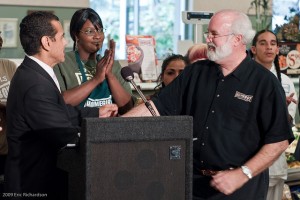
Father Greg Boyle (cc) ericrichardson
Discovering a new hero — Father Greg Boyle, founder of Homeboy Industries — thanks to a recent inspiring article House Of Second Chances on Fast Company. The curiosity spiked by that article led to two books G-Dog and the Homeboys: Father Greg Boyle and the Gangs of East Los Angeles by Celeste Fremon and Tattoos on the Heart: The Power of Boundless Compassion by Gregory Boyle (yes, the G-Dog himself!). Rating for both the books: Must Read.
Came across a thought-provoking passage in the Celeste Fremon book on the disconnect between public policy and real-world experiences, research, and learning.
For the first ten years after G-Dog and the Homeboys was published, although academics (and a few journalists like me) learned much about the underlying causes of gang violence, very little of the knowledge seemed to enter the arena of public policy. “In dealing in a practical way with street gangs, the greatest impediment had been, and remains, the absence of shared information about their nature,” wrote Malcolm Klein in 2004 (Klein is professor emeritus at the University of Southern California and one of the country’s dean of gang research.) As a result, most state and national funding was funneled to law enforcement and incarceration facilities with little left over for prevention and intervention measures – a policy that, as Father Greg would put it, is about as effective as attempting to cure cancer by giving all the money to the undertakers.
pages 4-5 in G-Dog and the Homeboys: Father Greg Boyle and the Gangs of East Los Angeles by Celeste Fremon
Unfortunately, this is true not just of gang violence, but also of many other cases as well.
